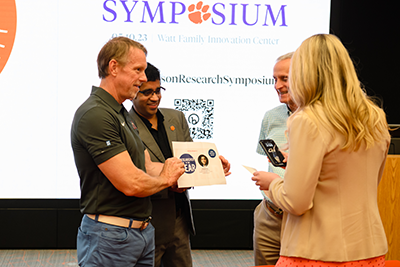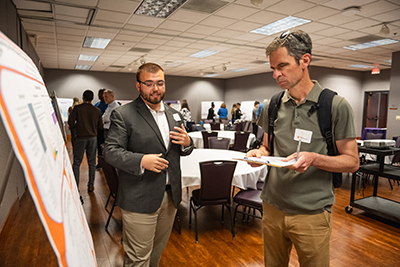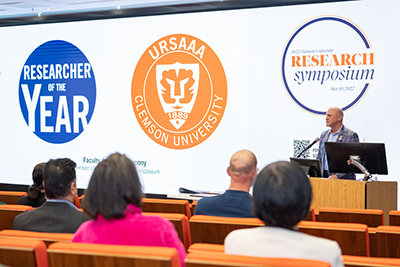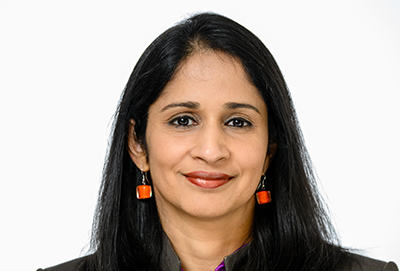2025 Research Symposium
The 2025 Clemson University Research Symposium was held on May 7, 2025, at the Watt Family Innovation Center. The theme this year was “Navigating an Evolving Academic Landscape” with faculty joining together to discuss the process and practice of research and creative endeavors. The event also included announcements of the Researcher of the Year and University Research, Scholarship and Artistic Achievement Awards, along with updates from Provost Bob Jones and Tanju Karanfil, senior vice president for research, scholarship and creative endeavors, and a panel discussion with associate deans for research for each college.
The agenda from the event is listed below.
2025 Research Symposium Agenda
Wednesday, May 7, 2025 Watt Family Innovation Center
| Time | Agenda Item |
|---|---|
| 7:45 am | Registration, breakfast and coffee available in the atrium |
| 8:15 am | Welcome from Symposium Chairs Amanda McLeod and Andrew Metcalf (auditorium) |
| 8:30 am - 9:15 am | Update from Provost Bob Jones and Senior Vice President Tanju Karanfil (auditorium) |
| 9:15 am - 10:30 am | Keynote Panel: College ADRs (auditorium) |
| 10:30am - 10:45 am | Break |
| 10:45 am - 12:00 pm | Morning Breakout Sessions |
| 12:00 pm - 1:00 pm | Lunch available in the atrium |
| 1:00 pm - 2:15 pm | Afternoon Breakout Sessions |
| 2:15 pm - 2:30 pm | Break |
| 2:30 pm - 2:45 pm | Grad 3-minute Thesis Presentations (auditorium) |
| 2:45 pm - 3:30 pm | Awards Ceremony with President Clements (auditorium)
|
| 3:30 pm | Adjourn |
Morning Breakout Sessions (10:45am-12:00pm)
-
Tigers in the Headlines: Elevating Clemson Research Through the Media
Room 108 Auditorium
Panelists:
- Alex Brooks, director of communications
- Heidi Coryell Williams, executive director of storytelling
- Danny Weathers, professor, Marketing
- Carlos Garcia, professor, Chemistry
Moderator:
- Shelia Cotten, associate vice president of research development
Abstract: What if everyone could appreciate and understand the work you do? Whether you are a part of designing buildings or differentiating human cultures, prepare to take high-level insights and outreach and turn it into something more akin to “party talk,” easily understandable by a range of audiences. The Marketing and Communications division, in conjunction with the Division of Research, will present a panel discussion highlighting the importance of communicating research with external audiences. Panelists will discuss ways to amplify scholarship and connect general readership audiences with Clemson-led research. Faculty will discuss the process and the benefit that these tools can bring to individual faculty members and the institution. A potential next step of this panel would be a media training workshop in the future.
-
Developing Opportunities to Enhance Student Learning
Room 106
Panelists:
- Sallie Hambright-Belue, associate professor, School of Architecture
- Matthew Lawrence Nicolette, assistant professor, School of Architecture
- Brooke Bennett, assistant professor, Psychology
- Anna Baker, assistant professor, Psychology
Moderator:
- Irene Pericot-Valverde, assistant professor, Psychology
Abstract: This panel discussion will focus on ways to enhance student learning and classroom experiences by engaging students in research, service-learning experiences, and experiential learning opportunities. The panel will also discuss how this work can be used to further faculty research, which can be an incentive for faculty to introduce these opportunities into their teaching responsibilities. As the University strives to offer the #1 Student Experience, this panel will be valuable to others who want to develop their courses to be more engaging for students.
-
Bridging Colleges: Unlocking the Future of Health Research Through Interdisciplinary Collaboration
Room 208
Panelists:
- Cullen Jackson, clinical professor, Industrial Engineering
- Lesley Ross, director, Institute for Engaged Aging
- Jim Morris, professor, Genetics and Biochemistry
- Alexis Stamatikos, assistant professor, Food, Nutrition and Packaging
Moderator:
- Kerry Smith, director, Eukaryotic Pathogens Innovation Center
Abstract: This panel discussion explores the transformative potential of interdisciplinary collaborations in health research between multiple colleges at Clemson. As healthcare challenges become increasingly complex, traditional single-discipline approaches often fall short of delivering comprehensive solutions. This panel brings together experts from diverse research areas - public health, engineering, social sciences and behavioral health - to share insights on the benefits and challenges of interdisciplinary research initiatives. Topics will include successful collaborations that highlight innovative problem-solving, the integration of varied methodologies and the cultivation of cross-disciplinary communication. Participants will leave with a greater understanding of how interdisciplinary approaches can enhance health research outcomes, ultimately contributing to more effective interventions and policies that address the multifaceted nature of health issues in today's society.
-
Supporting Faculty and Students on Their Research Translation Journeys
Room 218
Panelists:
- Rahul Raghuaman, PhD student, Industrial Engineering
- Olivia McAnirlin, co-director of the Virtual Reality & Nature Lab
- David Vaughn, director, Clemson Engineers for Developing Communities
- Chris Gesswein, executive director, Clemson University Research Foundation
- John DesJardin, professor, Bioengineering
- Eric Weissman, executive director, NextGEN
- Tia Dumas, associate vice president for strategic alliances
Moderators:
- Kuang-Ching (KC) Wang, executive director, STRIDE
- Craig Kinley, program coordinator, STRIDE
Abstract: The panel will feature speakers sharing their roles and experiences with respect to conducting and supporting research translation. The panelists will include faculty in different stages of research translation, tech transfer specialists from CURF and other internal and external support organizations in the innovation and entrepreneurship ecosystem, including Clemson STRIDE, NextGEN and SCRA. The panel will foster an open discussion with the audience about the challenges, rewards and the support one would encounter on research translation journeys.
-
Community-Engaged Research Across Education, Architecture & Construction, and Sociology
Room 308
Panelists:
- Chien-fei Chen, professor, Sociology
- Amer Hamad Issa Abukhalaf, assistant professor, Nieri Department of Construction and Real Estate Development
- Kristen Cuthrell, chair, Education and Human Development
- Darris Means, dean's fellow for rural education
Moderator:
- Phillip Grant, assistant professor, Educational and Organizational Leadership Development
Abstract: In this facilitated panel, faculty will provide exemplars of community-engaged research, i.e., partnerships in which researchers and practitioners collaborate to identify and implement opportunities for transformation that are informed by evidence generated through collaborative inquiry. College of Education faculty will dive into rural education research-practice partnerships. College of Behavioral, Social and Health Sciences faculty will explore the work of a recent NSF regional rural and urban sustainability network in the Southeast. College of Architecture, Art and Construction faculty will share community-driven approaches to disaster resilience. The discussion will center around these guiding questions:
- How have you leveraged community engaged research to support and sustain underserved communities?
- What institutional and environmental barriers to that work have you encountered, and how have you overcome those barriers?
- In what ways and to what extent has collaborating with university partners in varied disciplines contributed to your work?
- In what ways and to what extent has collaborating with non-university partners (e.g., K-12 educators, families, business leaders, community leaders) contributed to your work?
-
Empowering Researchers: AI-Driven Information Literacy and Predatory Publishing Detection
Room 310
Panelists:
- Anne Grant, University Libraries
- Fanchen Meng, director of analytics systems and apps, Watt Family Innovation Center
- Ruoyu Yang, research associate-machine learning, Watt Family Innovation Center
Moderator:
- Karen Burton, University Libraries
Abstract: This panel discussion will delve into the intersection of artificial intelligence, information literacy and the fight against predatory publishing. Panelists will explore how Clemson Libraries, in collaboration with interdisciplinary teams, has leveraged AI and machine learning tools to enhance research processes and explore innovative methods for detecting predatory journals. This session will highlight successful strategies for cross-disciplinary partnerships, ethical AI use in research and creative solutions to complex challenges in the digital information environment. Join us to discover how AI and information literacy can safeguard the integrity of academic publishing and foster responsible scholarship.
-
How May We Serve You? Clemson University Core Facilities – An Overview and Discussion of Available Services
Room 316
Panelists:
- Matt Breed, attending veterinarian/director of animal resources (Godley-Snell Research Center, Aquatic Animal Research Laboratory)
- Ken Webb, professor, S.C. Bioengineering Center for Regeneration and Formation of Tissues
- Chris Parkinson, director, Clemson University Bioinformatics and Genomics Facility
- Nishanth Tharayil, director, Multi-User Analytical and Metabolomics Lab
- Kelliann Koehler, research specialist, Electron Microscopy Facility
Moderator:
- Terri Bruce, director, Clemson Light Imaging Facility
Abstract: This session will include brief talks/descriptions of available multi-user cores (university and department level) and how to access them, including a discussion of contacts and how to use scheduling systems, such as iLabs. The talks will be followed by a panel discussion with core directors from across campus.
Afternoon Breakout Sessions (1:00pm-2:15pm)
-
Mentoring as a universal enabler for innovation
Room 108 Auditorium
Panelists:
- Marieke Van Puymbroeck Chancellor, associate dean, Graduate School
- Lori Dickes, professor, Political Sciences
- Sheila Cotten, associate vice president for research development
- Tia Dumas, associate vice president for strategic alliances
Moderator:
- Stephen Creager, associate dean, College of Science
Abstract: Mentoring is a universal activity that impacts students and faculty alike in many areas of their lives including the pursuit of research. Mentoring includes elements of onboarding for new students / employees and of evaluation (e.g. student grading and faculty annual evaluations) but it is also distinct from these, providing access to experience and guidance that can greatly enhance educational and professional work. The pursuit of impactful research may be greatly aided by impactful mentoring. This moderated panel discussion will address similarities and differences in mentoring for graduate students, faculty, and university leaders. Stephen Creager, Associate Dean in Science, will moderate the panel which will include the following persons as panelists: Tia Dumas, Associate Vice President for Strategic Alliances and Leader of the Clemson Chair Academy; Lori Dickes, Director of the Office of Faculty ADVANCEment; Marieke Van Puymbroeck, Associate Dean of the Graduate School; and Shelia Cotten, Associate Vice President for Research Development. Panel discussion will address ways in which leaders can promote / encourage impactful mentoring, specific things that leaders seek to accomplish and to avoid in mentoring programs, and similarities / differences in approaches to mentoring for different groups.
-
Achieving Professional, Effective Graphics Efficiently with Available Clemson Resources
Room 106
Panelists:
- Stacie Poore Powell, data services librarian, University Libraries
- Yaswanth Mulakala, data visualization specialist, University Libraries
Moderator:
- Brad Walters, program manager, Office of Research Development
Abstract: The Office of Research Development (ORD) and the Data Visualization Lab (DVL) have partnered to present a workshop on Clemson’s technical graphic and data visualization resources. This workshop will offer an in-depth exploration of Clemson’s extensive yet underutilized infographic resources, equipping researchers with the tools to enhance the professionalism and effectiveness of their grant proposal visuals. Attendees will leave with a deeper understanding of Clemson’s visualization resources and strategies for integrating data visualization and technical graphics into their grant proposals, ultimately enhancing clarity, professionalism, and competitiveness in funding applications.
-
Demystifying NIH Funding
Room 208
Panelists:
- Lesley Ross, director, Institute of Engaged Aging
- Sarah Floyd, assistant professor, Public Health Sciences
- Xia Jing, associate professor, Public Health Sciences
Moderator:
- Morgan Simpson, research development specialist, Office of Research Development
Abstract: This panel discussion will provide guidance and advice to faculty interested in submitting proposals to the NIH who might not have much experience with applying for/receiving NIH funding. Discussion topics will include the different types of NIH funding mechanisms, the preparation, submission and revision of NIH proposals, and perspectives on the NIH review panel process. The panel session will also introduce faculty to the NIH Accelerator program, which is designed to provide guidance and mentorship to investigators seeking NIH funding.
-
High-Performance Computing in Bioinformatics
Room 218
Panelists:
- Rooksana Noorai, assistant director, Genomics and Bioinformatics
- Vijay Shankar, biostatistician, Center for Human Genetics
- Alex Feltus, professor, Genetics and Biochemistry
- David Feliciano, associate professor, Biological Sciences
- Shahid Mukhtar, professor, Genetics and Biochemistry,
- Christopher Parkinson, professor, Biological Sciences
Moderator:
- Zachary Gerstner, HPC research computing facilitator
Abstract: This panel will discuss the current state and evolution of bioinformatics in HPC at Clemson and beyond. The panel will discuss Palmetto/Secretariate's impact on their work, how their use of HPC has evolved over time, and how HPC & AI are contributing to the future of bioinformatics research.
-
Translating Industry Partnerships into Scalable Knowledge: Building Training, Databases, & Toolkits
Room 308
Panelists:
- Anjali Joseph, director, Center for Health Facilities Design & Testing
- Dina Battisto, professor, School of Architecture
- Vivek Sharma, assistant professor, Nieri Department of Construction and Real Estate Development
Moderator:
- Lyndsey Deaton, assistant professor, School of Architecture
Abstract: In this panel discussion, we will explore how pilot or example projects with industry partners can evolve into scalable, impactful tools, training programs and databases that benefit the broader sector. The session will emphasize the importance of academia in designing, maintaining and updating these resources due to our impartiality and commitment to ensuring consistency across the industry. Panelists will share insights on the process of translating successful pilot projects into standardized, widely applicable resources. Attendees will gain strategies for fostering long-term collaborations between academia and industry, ensuring that tools and training are both effective and sustainable for future use. In this session, I will present three distinct projects that demonstrate how academia can develop toolkits, databases and training programs that translate industry partnerships into scalable, standardized resources.
- Leveraging the Value of Social Media Data for Scientific Inquiry
-
Leveraging Research Metrics for Strategic Growth: Insights from Three Vendors
Room 316
Panelists:
- Deron Morgan, representative for InCites
- Patty Smith, representative for Dimensions
- Scott Bard, representative for SciVal
Moderator:
- Elias Tzoc, associate dean, University Libraries
Abstract: As Clemson University continues to document its growing research success and aims to double its research expenditures by 2035, understanding and leveraging research analytics and metrics are more crucial than ever. This panel brings together representatives from three leading research platforms -- InCites, Dimensions and SciVal -- to provide an overview of their key features and unique capabilities. These technologies are essential for documenting and showcasing research impact and metrics, particularly at R1 and AAU institutions. This session will offer valuable insights into enhancing research strategies and outcomes. Join us to learn how these powerful resources can help Clemson achieve its ambitious research goals.





